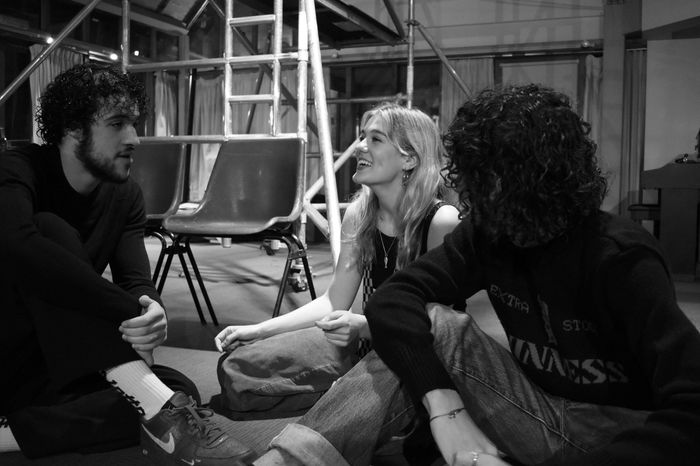Parlour Song: a quiet yet explosive domestic drama
Top-notch direction, design, and performances come together to create a must-see evening at the theatre

It’s like a car crash on the motorway. Or CPR down the highstreet. Or, for demolition expert Ned, the mesmerising scene of a block of flats coming crashing down. You can’t help but look, though the whole thing’s falling apart – beautifully. In her production of Parlour Song (Jez Butterworth), director Neve Kennedy is the real demolition expert, calculating the collapse of a home and a marriage with a perfection that knocks the ‘amateur’ off the ADC.
Ned (Bella Ridgwell) and Dale (Ollie Flowers) are neighbours at a new estate in suburban north London: identical houses, down to the crack in the window, just mirrored. And Ned’s a simple man: he likes his wife, Joy (Louisa Grinyer) – sue him! Ned likes making dinner for his wife, playing Scrabble for his wife, getting fit for his wife, fighting baldness for his wife. And demolishing buildings. Dale washes cars, babysits Ned. For such close friends, it’s hard to tell where their common interests lie. Other than Joy. And when Ned starts to lose things around the house, there’s only one way this story can pan out.
“This tragicomic Othello for the modern day is a work from a cast and crew at their best”
It’s one thing for a play to immerse its audience in the cosy corner of the Corpus Playroom or a small college venue. But to do it in the relative vastness of the ADC takes real talent, here found in the form of stellar production team Lucas Holt, Izzie Sayer, Jeremy Zolnai-Lucas. The set is captivating, fleshing out the domestic sphere with a full kitchen, living room, and looming above like a question mark, the figure of the bed. Cold, electric-blue lighting filters from a flickering TV, the underlights of the kitchen counter, and the fridge: it’s magnetising, worthy of the West End. And then come the projections, at times dividing scenes with neat surtitles, and at others flooding the theatre with buildings as they disintegrate. It’s heavy-handed, but how can a demolition be subtle?
There are only three actors in this play – small for a mainshow. But in her director’s note, Kennedy explains her interest in smaller casts: “Three characters have the power, excitement and impact of twenty when they’re written by Jez Butterworth.” I’d add that three characters can easily become twenty when they’re played by Bella Ridgwell, Ollie Flowers and Louisa Grinyer. Ridgwell plays a middle-aged man of suffocating tenderness with uncanny accuracy, and Flowers’ arrogant peacocking seems almost second-nature. Their work-out scenes and Ned’s cunnilingus lessons are the play’s comedic highlights, balancing tragedy with “volcanic orgasms” and something minty from Victoria’s Secret (another of Dale’s solutions to Ned’s marital troubles). But behind even the most genuine of friendships is a dynamic of power, and Flowers’ slick manipulation of Ned gives Dale the upper hand. It’s sinister, but you can’t look away.
Ned rummages around for the right word, grasping at clichés like a man who has never learnt to say what he feels. For Ned, things are “good, good … recently less good. Recently… not so good,” until they’re “recently not good”. It would be easy to dismiss him as just another emotionally infantile man. But choosing a female actor for Ned makes Ridgwell’s characterisation all the more honest and painful. To quote an interrupting audience member: “Oh dear, Ned”.
Grinyer adds a contrapuntal note in her performance of a woman bound to a man she no longer loves. She’s cruel, hemmed in by semi-detached domesticity, with each line barbed to cut Ned. Butterworth borders on sexist caricature in her envy and desire, but as Ned’s unravelling veers to the violent, her dreams of escape become desperately real. Butterworth’s writing makes his female character the shallower of the three, but Grinyer gives Joy a language of her own.
By the end of the play, confusion grows, and it is difficult to pick apart what is left in the rubble. Dreams blur into reality; everything and nothing changes. There’s little sense of an ending, and we’re beyond the realms of traditional tragedy. It’s an appropriate final note in this Parlour Song, and all that is left wanting is a slower tempo in the three final monologues as we recover, sleep-deprived and unsettled, from a torrent of dreams and nightmares.
This tragicomic Othello for the modern day is a work from a cast and crew at their best. From the set to the lighting to the sound to the formidable acting, Parlour Song flies high above the rest as evidence that student theatre is not, in any way, amateur.
 News / CUP announces funding scheme for under-represented academics19 December 2025
News / CUP announces funding scheme for under-represented academics19 December 2025 News / Cambridge welcomes UK rejoining the Erasmus scheme20 December 2025
News / Cambridge welcomes UK rejoining the Erasmus scheme20 December 2025 Comment / Yes, I’m brown – but I have more important things to say22 December 2025
Comment / Yes, I’m brown – but I have more important things to say22 December 2025 News / SU reluctantly registers controversial women’s soc18 December 2025
News / SU reluctantly registers controversial women’s soc18 December 2025 Film & TV / Timothée Chalamet and the era-fication of film marketing21 December 2025
Film & TV / Timothée Chalamet and the era-fication of film marketing21 December 2025









